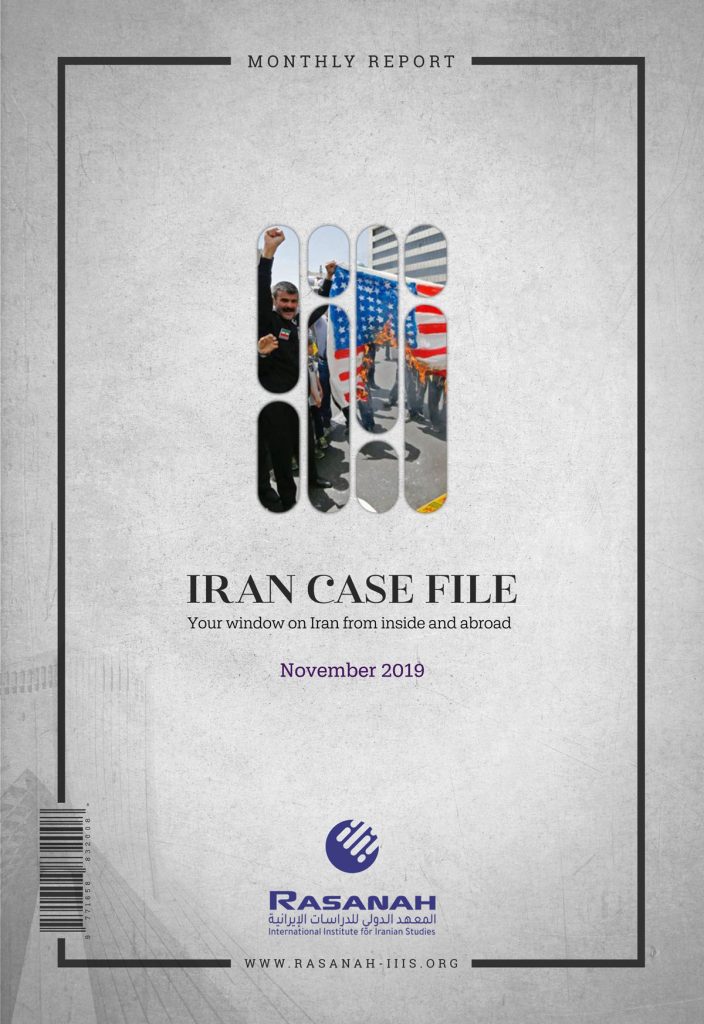The International Institute for Iranian Studies (Rasanah) has just issued its monthly Iran Case File (ICF) for November 2019, providing readers in general and researchers in particular an accurate and detailed review of Iranian affairs, exploring its features and interactions at various levels. The report is divided into three main parts: Internal Affairs, International Affairs and Arab Affairs.
I- The November Protests
Internal Affairs, particularly in The Political File, explores how the Iranian establishment took steps this month which widened the gap between it and the Shiite citizens in Iraq and Lebanon. The Iranian religious establishment embraced a position that stands in opposition to the popular protests in the two countries. The Iranian establishment believes that the protests were instigated to undermine the Arbaeen marches in Iraq, sow discord between the Iraqi and Iranian people, target the axis of resistance and punish Iraqi officials who stood in the face of the illegitimate demands of Israel and the United States.
The Political File discusses the broader social and economic causes of the protests that spread across Iranian territories in the aftermath of the government’s decision to raise the prices of gasoline. The move was surprising and did not take into account the social dimensions and the subsequent suffering of the people
The Economic File reviews the gasoline crisis that has propelled many other social and economic problems, which is a direct result of the decline in the state’s revenues due to the embargo imposed on Iranian oil exports as well as the decline of all Iranian economic indicators due to US sanctions. Iranian oil exports declined from 2.5 million barrels per day before the sanctions to about 125,000 barrels per day. Economic growth rates fell from 12.5 percent in 2016 to a negative growth of 9.5 percent in 2019. Foreign investment fled from Iran after the country succeeded in attracting nearly $9 billion in 2016 to reach $3.4 billion in 2018. Meanwhile, the exchange rate increased from 4,009 tomans per US dollar in 2017 to 11,900 tomans in August 2019.
The Military File reports that Iran is now working on an ambitious program to boost the capabilities of its naval forces with the aim of conducting intensive movements in deep waters and achieving military superiority regionally.
II- Iraqi Protesters Reject Iran’s Influence in Their Country
Arab Affairs discusses the widespread protests have been ongoing in Iraq over the past two months. The strongest participation in the protests was seen in the Shiite-majority southern provinces and the protesters reiterated their rejection of sectarianism, confirming that their protests have arisen due to a growing national sentiment. The foremost popular demand has been for a total change of the political system in order to get rid of sectarian quotas, naming a new prime minister, amending the electoral law and dissolving the Parliament. Iraqi protesters reiterated their unmitigated rejection of Iranian meddling in Iraqi affairs by setting fire to the Iranian flag, tearing up pictures of the supreme leader and Qods Force commander, burning the Iranian consulate in Karbala and targeting the headquarters of armed militias loyal to Iran. Iran has put pressure on Abdul-Mahdi to stay in office and suppress the protests through the use of repressive security measures. However, the demands of the protesters have been met as Abdul-Mahdi resigned.
Moreover, Arab Affairs explores the latest development in the Yemeni crisis the month of November. the legitimate government and the Southern Transitional Council signed the Riyadh Agreement, which stipulates that the government shall form a cabinet composed of 24 ministers as well as the ministerial positions shall be divided equally between the northern and southern provinces of Yemen. Iran was agitated by the agreement and described it as “incomplete.”
Finally, International Affairs reviews the latest developments in the crisis between the United States and Tehran. The United States has openly declared support for the protests in Iran and blamed the Iranian government for killing protesters. It also imposed a new package of sanctions on the country, including nine individuals and entities close to the supreme leader. France, the UK and Germany hinted at the possibility of activating the dispute settlement mechanism in the JCPOA through which the nuclear file could be referred to the UN Security Council and UN sanctions could be imposed on Iran.

